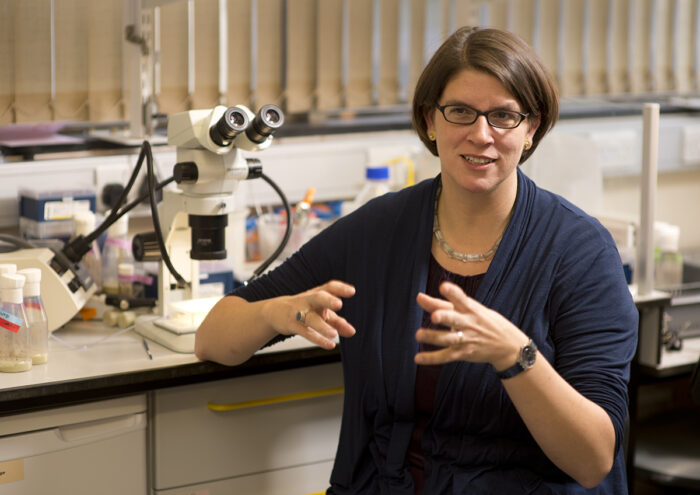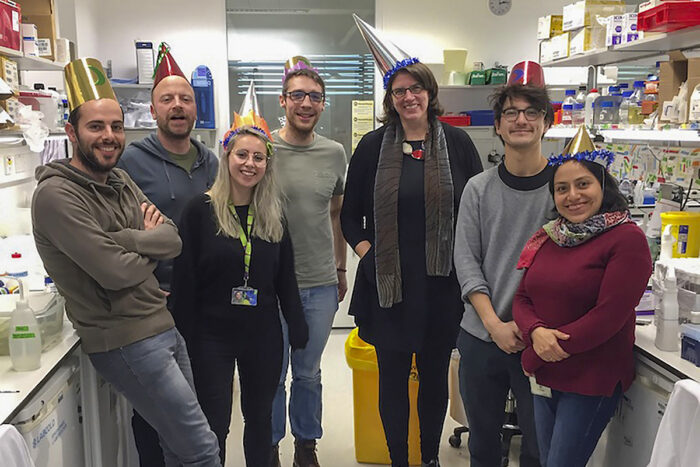Next in our series of Group Leader profiles based on interviews with science writer and LMB alumna, Kathy Weston, is a profile of Katja Röper, a Group Leader in the LMB’s Cell Biology Division.

Witnessing the fall of the Berlin Wall, and then doing your undergraduate degree in the building where Lise Meitner and Otto Hahn discovered nuclear fission is a more eventful start to a life in science than most people’s, but for Katja Röper, it was all part of growing up in Berlin. After leaving the excitement of her home city for a PhD in the relative calm of Heidelberg, Katja came to Cambridge as a postdoc in 2001, and has remained there ever since. After ten years downtown, first working in Nick Brown’s lab at the Gurdon Institute and then in an independent position in the Department of Physiology, Development and Neuroscience, she moved to the LMB first as a Senior Investigator Scientist, then a group leader.
Katja’s lab ‘pet’ as she calls it, is the fruit fly Drosophila, and she’s using the development of fly salivary glands as a model to study the formation of tubular organs. “When you watch development under a microscope, it’s beautiful and fascinating”, she says. “How does it happen in such a highly coordinated way? You can’t help but want to know how that can be achieved.” Tubular organs, which in humans comprise most of our insides – lung, kidney, liver, gut, and so on – are formed from simple sheets of epithelial cells, and Katja’s lab is working out how changes in cell and tissue shape are regulated such that the organs are formed in the right place at the right time. It’s a complex problem reaching far beyond conventional cell biology, as Katja acknowledges: “At the molecular level it’s clear that there are a lot of proteins that are mechanoresponsive; they can sense force in cells and junctions, but how they do it, and the consequences, are very poorly understood”, she says.

Katja has two sons, both born while she had her independent fellowship at the University. As is true for many women scientists, her partner is also an academic, and they have always shared parenting equally: “We always felt that was how it should be, right from the beginning”, Katja says. Being a scientist gives time flexibility, which helps the parenting, but accommodating two scientists’ schedules also requires some juggling, so having a supportive partner is important.
Adding to her busy life, Katja also sings in a choir, and has done ever since her University days in Berlin. She feels it to be an important bit of ‘me’-time: something outside the lab and family that she is good at and enjoys enormously.
Of necessity, running a lab at the LMB means a small group size, which in turn drives research choices. “You can’t spread too widely – you have to be focussed”, Katja says. Having a small group also means she frequently finds herself talking about unpublished work: “Although I’m quite competitive, it’s in a friendly way”, she says. “I would find it very boring and unproductive if I was so competitive that I felt I had to restrict my lab from talking about new data at meetings.”

Despite her own confidence, Katja thinks that the increasing levels of support at the LMB for women, and young faculty in general, are helpful. “There’s a new group leaders’ group that meets monthly for lunch and presentations, and the female group leaders get together once a fortnight for coffee and a chat, which has been great”, she says. “Gender-wise, we’re pretty even here at PhD and postdoc level but like most places, at faculty level, it would be nice to have more female role models, so that female students and postdocs can feel more confident about progressing in science. And obviously, the more family-friendly and balanced a place is, the better it is for everyone, especially women”.
Being an academic scientist can be tough at times, Katja acknowledges, but the freedom and flexibility it gives more than make up for the tribulations. “It can be difficult, and for students and postdocs coming through the system, there are a lot of people out there trying to do the same thing. But it’s a great job – you can do what you enjoy and choose what you want to study”, she says. “Science used to be very vocational and even now, although it’s viewed much more as a career, you still have to invest a lot of passion in it – it’s not just a job!”
This article is based on an interview by Kathy Weston, February 2019.